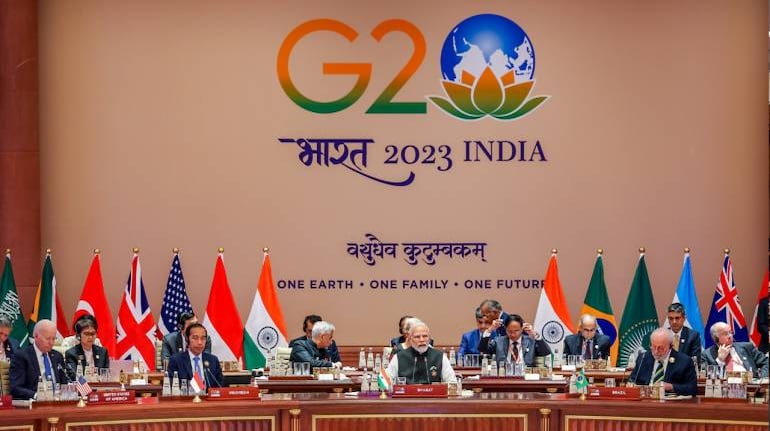



Even for the world’s fastest-growing economy, forging a consensus among the G20 countries on the language to describe two of the most divisive issues – the war between Russia and Ukraine and the resultant food and energy insecurity – was considered nearly an impossibility. Therefore, it was widely expected that the Indian Presidency may not be able to reach a joint statement or communiqué.
Get G20 Summit Live UpdatesBut, on September 9, just over half-way into the first day of the two-day Summit, Prime Minister Narendra Modi announced the adoption of the New Delhi Leaders' Declaration. G20 Sherpa Amitabh Kant quickly took to X, formerly Twitter, and said the declaration was reached with 100 percent consensus on all developmental and geo-political issues.
There is, however, little doubt that vital adjustments to the language surrounding the conflict in Ukraine from the Bali Declaration helped India clinch unanimous backing from members of the G20.
New Delhi versus BaliFirst things first, the New Delhi Declaration did not directly refer to Russia’s invasion of Ukraine and instead took a more generic view, making note of the “immense human suffering and the adverse impact of wars and conflicts around the world”.
“All states must refrain from the threat or use of force to seek territorial acquisition against the territorial integrity and sovereignty or political independence of any state. The use or threat of use of nuclear weapons is inadmissible,” the Leaders’ Declaration agreed under India’s Presidency said.
To be sure, the New Delhi statement did recall the discussions in Bali and said members reiterated “our national positions and resolutions adopted at the UN Security Council and the UN General Assembly.” However, explicit condemnation of Russia was conspicuous by its absence, making the New Delhi Declaration a seemingly watered-down version of its predecessor.
The Bali Declaration had said: “Most members strongly condemned the war in Ukraine and stressed it is causing immense human suffering and exacerbating existing fragilities in the global economy - constraining growth, increasing inflation, disrupting supply chains, heightening energy and food insecurity, and elevating financial stability risks”.
Where Russia did find mention in the September 9 statement was in reference to the Black Sea Grain Initiative. The grain supply agreement – brokered by the United Nations and Turkiye in July 2022 – was broken by Russia on July 17. A day later, it bombed Ukrainian ports. Interestingly, Russia pulled out of the deal in the midst of the Gandhinagar meeting of Finance Ministers and Central Bank Governors. It was little surprise then that the G20 members swiftly condemned Russia for its actions. Two months later, the G20 just wants the Black Sea Grain Initiative up and running again.
Another key difference between the two declarations is the word “sanctions” that featured in the Bali statement but did make it to the New Delhi Declaration.
To be sure, both the statements acknowledged that the G20 was not the appropriate forum to resolve security issues. But dropping the word ‘sanctions’ in the final declaration marks a shift from the Chair’s Summary and Outcome Document that was issued after the Gandhinagar meeting of finance ministers and central bank governors.
Russia’s view for some time has been that the G20’s language is one-sided and has pushed for the inclusion of the impact the economic sanctions imposed on it by Western countries has had on the entire global economy.
The Indian point of view on the differences in the language between the Bali and New Delhi declarations was best summed up by External Affairs Minister S Jaishankar: “Bali was Bali, New Delhi is Delhi. Many things have happened since the Bali Declaration.”
A win-win-win?The New Delhi Declaration signifies a major win for India’s G20 presidency, particularly given the geo-political circumstances. At the same time, it is also a victory for Russian Foreign Minister Sergei Lavrov, who will leave the Indian capital happy that an explicit mention of Russia’s aggression has been avoided despite the G7 nations’ sharp attack over the last few days.
Finally, if the G20 gets its way and the Black Sea Grain Initiative is immediately revived, it will also be a win for the developed as well as developing nations, who are having to bear the burden of higher food items that Russia and Ukraine export.
The one aggrieved party in all this is Ukraine, with a spokesperson for the Ukrainian foreign ministry saying the G20 had “nothing to be proud of”.
Discover the latest Business News, Sensex, and Nifty updates. Obtain Personal Finance insights, tax queries, and expert opinions on Moneycontrol or download the Moneycontrol App to stay updated!
Find the best of Al News in one place, specially curated for you every weekend.
Stay on top of the latest tech trends and biggest startup news.